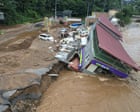
This weekend has spotlighted the resilience needed in the face of Mother Nature’s formidable forces, as various regions across the globe contend with the impacts of severe weather patterns. In the calm observation of the unfolding events, we’re reminded of the natural world’s immense power and our collective response to its challenges.
In South Korea, the country is grappling with the aftermath of record-breaking rainfall that has tragically resulted in the loss of at least 17 lives. An additional 11 individuals remain unaccounted for as landslides and sweeping floods have touched various provinces. On early Sunday morning, the tranquility of Gapyeong County, a resort area located 40 miles east of Seoul, was disrupted by nearly 170mm of rainfall, prompting landslides that engulfed homes and carried away vehicles. As efforts continue to manage these consequences and locate missing persons, the community shows remarkable solidarity and perseverance in the face of adversity. Emergency teams are working tirelessly to restore relief, exemplifying humanity’s compassionate resilience in the face of nature’s might.
Simultaneously, Typhoon Wipha has made its presence felt in Hong Kong, prompting the city to issue its highest tropical storm warning. This has led to widespread precautions such as the cancellation of flights and school activities. As of Sunday morning, the typhoon’s center was located approximately 60 kilometers southeast of Hong Kong. The sight of massive waves striking the eastern coast of Hong Kong Island paints a powerful image of nature’s energy at work. Nevertheless, authorities and citizens are prepared, taking decisive action to ensure safety and welfare. The cooperation between residents and local officials is a testament to communal resilience and preparedness, highlighting the importance of collective effort in weathering such storms.
Further afield, the UK has been advised to brace for significant rainfall over the next 24 hours. The Met Office has issued yellow warnings across various areas including Northern Ireland, Scotland, and parts of England in anticipation of half a month’s worth of rain. Thunderstorm warnings accompany these forecasts, prompting local officials to gear up for potential disruptions. Preparations have been put in place to address and mitigate impacts, thereby safeguarding communities. In this, we see an exercise in foresight and planning, ensuring that individuals and families remain informed and protected against prospective weather challenges.
In these events, while the might of natural phenomena can be both breathtaking and challenging, there also lies an opportunity for reflection and adaptive learning. Each region’s response encapsulates a mindful approach to risk management and community fortitude. As we observe and gain insights from these occurrences, there is much to learn about harmonizing with the environment and fostering deeper resilience.
Evidently, weather extremes are increasingly becoming a part of our modern realities, necessitating a mindful awareness of environmental changes and proactive approaches. By embracing calmness and collaboration, communities around the globe continue to confront and adapt to these challenges, demonstrating the unyielding human spirit. As we face these atmospheric displays of force, the focus on safety, preparation, and unity becomes paramount, exemplifying that while we may not control the weather, we are not powerless before it.
As we continue to navigate the evolving climate landscape, the stories emerging from such events remind us of the need for global solidarity and innovation in addressing environmental issues. By sharing knowledge and resources, countries can better prepare and adapt, ensuring that as natural events occur, their impacts are met with preparedness and resilience. Together, in awareness and action, we can forge pathways to safeguard our communities, creating a safer, more enlightened world for future generations.
Source: {link}
